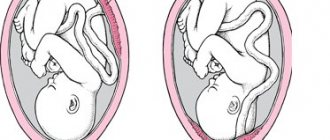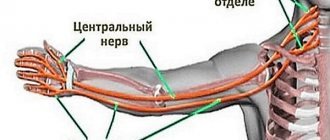To prevent someone’s illiterate opinion from leading you to an unjustified abortion, read about what to do if you have herpes and pregnancy at the same time.
Herpes of newborns occurs as a result of intrauterine infection, mainly with the herpes virus of the second type. Contributing factors for infection of a child with the herpes virus during pregnancy are primary infection of the mother or exacerbation of herpes during pregnancy.
In fact, the risk of embryo infection is not as great as it is described. Moreover, it cannot be determined reliably. And in cases where the fetus is infected with viruses from the mother, the disease may not develop: it is possible, as in adults, to be asymptomatic carriers.
An exacerbation of genital herpes that occurs after 32 weeks of pregnancy is really dangerous. If the attending physician discovers such an exacerbation after the specified period, then a cesarean section is usually recommended, since there is a high risk of infection of the fetus as it passes through the birth canal.
Herpes during pregnancy: types and characteristics of the virus
The causative agent of herpes is a virus. By its nature, it is an intracellular parasite that requires cells of the human body to reproduce. There are several types of herpes infection to which a person is susceptible. Of these, the best known are herpes simplex and chickenpox viruses . Less known are Epstein-Barr viruses, cytomegalovirus, and pseudorubella.
Infection with the herpes virus can cause an acute reaction. It may also be asymptomatic. The nature of the reaction (acute or subtle) depends on the person’s immunity . Strong immunity quickly takes control of the invading virus and limits its reproduction (remember that the herpes virus is an intracellular parasite
, which is introduced into the human body for the purpose of reproduction). With strong immunity, visible symptoms of infection may not occur or may appear weakly (in the form of small rashes without fever and general malaise).
With weak immunity, the body takes a long time to form an immune response. The process of recognizing the virus and producing antibodies to fight it takes several days. During this time, herpes manages to spread and form extensive rashes on the skin. After some time, the body takes the virus under control and limits its further reproduction and the appearance of new rashes. The stage of recovery and wound healing begins.
Primary infection with herpes
The most acute reaction is caused by primary infection with reduced immunity . In this case, the following are formed:
- heat;
- general intoxication and malaise;
- round lesions of a blistering rash that itch and hurt at the same time.
2-3 after the rash, the blisters burst, neighboring blisters merge into a common wound and become covered with a crust. After another 3-4 days, the crust dries out, by which time new skin has formed under the crust. Further rashes stop. This course of development of the disease indicates that the immune system has responded and the reproduction of the virus has been brought under control.
If the immune response is insufficient, the wound will not heal. Liquid (exudate) oozes from under the crust, and the rash spreads to other areas of the skin.
Secondary manifestation of infection
Secondary manifestations of infection are not as dramatic as the first ones. They are called relapses. Secondary infections form against the background of a temporary decrease in immunity in the presence of chronic virus carriage (everyone who becomes infected with herpes becomes a lifelong carrier of this virus).
The intracellular parasite settles in the cells of the spinal cord ( neurocytes
) and is stored in inactive (sleeping, latent) form.
Strong immunity – controls it and prevents re-activation. Reduced immunity is unable to control the virus. It “ wakes up
” and actively reproduces. Round spots of a blistering rash form again on a person’s skin.
Interesting to know: contact with the herpes virus does not guarantee 100% infection. At the beginning of the “attack,” viruses attach to the membranes of mucosal epithelial cells. After some time, they either penetrate into the cell or “fall off” from it. The development of events, susceptibility and the possibility of infection depend on “cellular” immunity. If the cell membrane is impermeable to the virus, infection does not occur.
Relapses of herpes occur when immunity decreases ( during a cold, inflammation of other organs, poisoning, pregnancy, menstruation, etc.
). Some people experience itchy blisters on their lips every time they have a cold. And in women, herpes often “wakes up” during menstruation or pregnancy.
Virus carriage during pregnancy: good or bad?
Herpes in pregnant women is dangerous for the child during primary infection . At the first contact with the infection, the mother’s body does not yet have immune bodies to control it, so herpes penetrates through the placental barrier into the blood of the uterine child. The probability of the virus entering the blood of the fetus during the primary infection of a woman during pregnancy is 60% .
Secondary activation of the virus occurs in the presence of antibodies. Therefore, secondary manifestations of infection are not so extensive and not so dangerous for the development of the fetus. Immune defense works faster and provides more effective protection to the unborn child from infection. In case of relapse, the probability of infection of the fetus is 5% .
In addition, virus carriage and the presence of antibodies in the mother’s blood provide the baby with protection from infection in the first few months of life. From the mother's blood, immune bodies are transferred to the child's blood. Thus, in the initial period of life, the baby is protected from infection; if infected, he easily tolerates the disease and successfully forms his own immune bodies to fight the virus.
Causes
Primary herpes, which is most dangerous during pregnancy, can occur as a result of a woman's infection from an infected person. Routes of transmission of the virus: airborne or household contact. Genital herpes occurs when a pregnant woman is infected through sexual contact.
The virus can remain in a latent period for a long time, but when factors arise that reduce the body’s protective properties (colds, flu, hypothermia, vitamin deficiency, etc.), it enters the active phase and causes disease.
Hormonal imbalance, severe toxicosis, chronic fatigue and nervous disorders, poor nutrition and lack of sufficient physical activity can increase the body's susceptibility to viruses. All these factors negatively affect the immune system of the mother and unborn child and provoke activation of the virus.
Routes of transmission of the virus: airborne or household contact. Genital herpes occurs when a pregnant woman is infected through sexual contact.
Herpes during pregnancy: localization of rashes
The localization of a herpetic rash (the place of its appearance) is determined by the type of virus:
- Herpes simplex during pregnancy is located in the form of separate round rashes on the skin of the face or around the genitals . If the rash is located on the face, it is a type 1 virus or HSV-1. If the rash is localized around the anus and genitals, it is a type 2 virus or HSV-2. The first type of herpes is called labial or oral. And the second is genital or sexual. Genital herpes during pregnancy creates the possibility of infecting the child both during pregnancy and during childbirth.
- Herpes zoster during pregnancy forms extensive rashes all over the body - most often on the sides around the torso, less often around the hips and legs or forearms and arms. When initially infected, herpes zoster is a well-known chickenpox infection. If it relapses again, it causes herpes zoster.
- Cytomegalovirus during pregnancy does not form rashes. Its appearance is accompanied by fever and symptoms of a cold infection (flu), and diagnosis is made using a laboratory blood test.
- Epstein-Barr virus also occurs without rashes. It forms infectious mononucleosis.
And now - in more detail about the localization of herpetic rashes in various types of herpetic infections.
Blistering rash on face
More often than others, herpes during pregnancy appears on a woman's face . This is the oral type or labial herpes. During pregnancy, it can also form rashes on the shoulders, neck, and décolleté.
The frequency of rashes on the face is explained by the widespread infection. The labial type of herpes affects 95% of the population of developed countries. Most women get the infection in childhood, so 95% of pregnant women are carriers
virus. Recurrence of herpes during pregnancy is facilitated by a physiological decrease in immunity, which forms during pregnancy for various reasons (more on this below).
Often the virus has “favorite” places for rashes (during relapses, blisters appear on the same “ traditional
» areas of the skin). For example, facial herpes on the lip during pregnancy appears along the outer border of the lips, in the corners of the mouth or inside the mouth - on the mucous membrane. It can also appear under the nose, on the cheeks, or on the cornea of the eye (ophthalmoherpes is one of the most severe complications of the infection). Herpes under the nose also causes discomfort. During pregnancy, it often occurs against the background of a cold and runny nose.
Rash around the genitals
Rashes in the genital area form less frequently than on open areas of the body. This rash is the result of the second (genital) herpes virus. Infection with this virus occurs during sexual intercourse; it is a sexually transmitted infection.
Carrying the HSV-2 virus is not so common. Only 20% of the population is infected with this type of herpes. Therefore, for most pregnant women, genital herpes during pregnancy poses a serious danger (due to the lack of antibodies to this type of infection).
Extensive rash all over the body and chickenpox
The well-known chickenpox is the third type of herpes infection or the Zoster virus. This disease is widespread; many women had chickenpox in childhood . Therefore, the virus does not pose a danger to their uterine child (a woman’s blood contains immune bodies that counteract the chickenpox virus).
If a woman does not have a history of chickenpox, she can become infected with it during pregnancy. With primary infection in the 1st trimester, the probability of the formation of pathologies is 5%. In subsequent trimesters, the likelihood of pathologies becomes even less. Therefore, as a rule, chickenpox or zoster does not harm the fetus in the womb .
Recurrence of chickenpox occurs mainly in older people. With very low immunity, it can appear in a pregnant woman. It is called shingles (it looks like extensive shingles around the body, or around the shoulders, hips).
When chickenpox recurs, the localization of the rash is determined by the exits of nerve endings to the surface of the skin. Therefore, post-varicella herpes in pregnant women is always extensive and very painful.
Traditional methods
Traditional methods in the treatment of herpes are, of course, auxiliary. They are used to eliminate signs of the disease during exacerbations. They promote healing of ulcers. Doctors recommend that pregnant women combine them with drug treatment.
- For intimate herpes, rosehip oil can be used to lubricate the vaginal walls. It is also recommended to do sitz baths with herbs that have antiseptic properties: string or chamomile.
- For herpes on the lips, the blisters are lubricated with fir oil. You can use sea buckthorn oil, chamomile tincture, calendula ointment, Kalanchoe juice, propolis tincture.
Remember that only your doctor should treat herpes during pregnancy. Any self-medication can be dangerous to the health of yours and your unborn baby.
What is dangerous about herpes during pregnancy: complications and pathologies
For a child developing in the womb, primary infection with the herpes virus during pregnancy is dangerous . How dangerous is herpes during pregnancy for a child? Let us list the pathologies that can develop when the fetus is infected through the placental barrier:
- Herpes during early pregnancy causes miscarriage in 30% of cases . A missed miscarriage is possible (frozen pregnancy - when the fetus dies in the womb, but the miscarriage does not occur).
- If the pregnancy continues, fetal development defects are possible (impairments in the formation of the brain and nervous system - cerebral palsy, epilepsy, blindness and deafness, heart defects, physical abnormalities).
- Primary herpes in a pregnant woman in the 3rd trimester, in the worst case, can cause fetal death and stillbirth or sudden death of the baby after birth (70% of infected children die). In the best case, primary infection causes premature birth (50% of infections in the 3rd trimester end with this).
The greatest danger is posed by genital herpes during pregnancy during initial contact with this type of virus. With primary infection in the 1st and 2nd trimester of pregnancy (from 1 to 6 months), genital herpes infection is an indicator of abortion.
Genital herpes during pregnancy is less dangerous if the mother is a virus carrier. In this case, the probability of infection during pregnancy is no more than 7%. The greater danger of infection appears later - during childbirth. Therefore, recurrence of genital herpes during pregnancy is an indication for delivery by cesarean section.
What is the danger of infecting a child with genital herpes during childbirth:
- In 45% of children, lesions of the skin and cornea develop.
- 35% have CNS diseases with subsequent death.
Conclusions: herpes can cause severe developmental pathologies in the fetus. Moreover, if the mother is a virus carrier, the probability of pathologies in the child is 5-7%. And if the infection occurs for the first time, the child suffers in 60-70% of cases.
Decreased immunity
Relapse or reactivation of herpes infection always occurs against the background of decreased immunity. During pregnancy, the weakening of immune reactions is called physiological and is considered normal . It is formed for the following reasons:
- Immunity decreases when a fertilized egg is implanted into the uterine lining to prevent rejection of the “foreign” organism.
- A decrease in immunity in the 2nd and 3rd trimester occurs due to a lack of vitamins, which are actively consumed during fetal development.
Immunity to herpes as a guarantee of child health
From all of the above, one should not conclude that getting herpes and having a healthy child are incompatible concepts. Only primary infection is dangerous. Most women who have had genital herpes give birth to absolutely healthy children, since the fetus is reliably protected by the mother's antibodies. It is noteworthy that the effect of antibodies continues several months after birth.
The risk of infection of a newborn depends on the severity of the disease in the mother, as well as on the duration of contact of the fetus with contaminated amniotic fluid and the birth canal. To prevent such phenomena, it is necessary to be tested for the presence of the pathogen in the body during pregnancy planning and a few weeks before birth. If the test result is positive, then a planned caesarean section becomes appropriate.
In addition, the doctor prescribes drug therapy aimed at eliminating the manifestations of the disease, reducing the frequency of possible relapses, and increasing immunity. Drugs are selected individually, depending on the characteristics of the herpetic process and its severity.
Treatment of herpes during pregnancy
Today there is no universal drug that would permanently relieve a woman of rashes. For the health of a pregnant woman and her child, it is better to be a carrier of the virus and have a small titer of antibodies in a blood test. And for this it is necessary to maintain immunity at a high level. But what to do if infection does occur?
Treatment of herpes in pregnant women uses proven antiviral drugs . They help the immune system take control of the virus and reduce the likelihood of it being transmitted to the fetus.
In addition, fetal condition is monitored . If obvious defects develop, the woman is advised to terminate the pregnancy. In the future, in order to bear a healthy child, it is necessary to carry out antiviral treatment before pregnancy (to reduce the activity of the virus, which will be reflected in a decrease in antibody titer).
Monitoring of pregnant women
Dynamic monitoring of pregnant women with three ultrasound examinations is required:
- at 10 - 14 weeks to assess the thickness of the collar zone;
- within 20 - 24 weeks, echographic markers of chromosome pathologies are detected;
- within 32 - 34 weeks, pathologies of late manifestation are detected.
The following symptoms may indicate signs of intrauterine infection:
- presence of suspensions in amniotic fluid;
- high or low water levels;
- “thick placenta”;
- brain cyst.
If the results are negative, additional in-depth examinations are carried out.
From the 16th to the 30th week, a blood test is performed. Tests for the presence of antibodies should be taken 4 times: every trimester and on the eve of childbirth.
Virological studies and gene diagnostics are reliable diagnostic methods.
During gene diagnostics, the presence of a DNA virus is detected, and as additional methods, RIF (immunofluorescence reactions) and ELISA (enzyme-linked immunosorbent assay) are used.
In addition, clinical examinations of the birth canal and vulva are necessary to identify latent herpetic lesions.
14 days before birth, pregnant women at risk require hospitalization to collect the contents of the cervical canal.
Herpes during pregnancy: drugs to treat the infection
Here are the characteristics of the most well-known drugs that can be used to treat herpes in a pregnant woman.
Acyclovir
Acyclovir is a specific antiherpes drug. When it enters the human body, it stops the reproduction of viruses (replication of viral DNA) without damaging human cells.
Acyclovir easily crosses the placental barrier and enters the fetal blood and breast milk. If necessary, it is used to treat pregnant and lactating women , but the admissibility of its use during pregnancy has not been fully studied. When treating pregnant women, preference is given to external agents (ointments). Internal treatment is prescribed only for primary infection or extensive relapse.
Important: it is recommended to supplement the intake of acyclovir with a sufficient amount of liquid.
A large number of pharmaceutical drugs are produced based on acyclovir. Let's list some: tablet forms - Gerpevir, Zovirax, Vivorax
, creams and ointments –
Atsik, Herperax, Zovirax
. With long-term treatment, herpes viruses develop resistance to the action of acyclovir. Therefore, drugs based on it are effective only during initial use.
Panavir
Panavir is a herbal preparation (made from nightshade plant extract). Its use is permitted in the 2nd and 3rd trimesters of pregnancy in the presence of an exacerbation or primary infection . The drug is effective against simple forms of herpes and cytomegalovirus. Available in the form of suppositories and gel.
Generic acyclovir
Famvir is one of the most effective generics of acyclovir. Its admissibility for pregnant women has not been proven, so Famvir is used only when there is a threat to the life of the mother or developing fetus .
Prohibited for use by pregnant women: Ganciclovir, Foscarnet.
Immune stimulants
Immune stimulants enhance immune responses and ensure accelerated production of antibodies in a woman’s body. Among the most common and studied stimulants are rectal suppositories Viferon and their analogue - Genferon. They are approved for use during pregnancy after 14 weeks - both for treatment and for the prevention of relapses. There are no recommendations for treatment with Viferon in the 1st trimester (there is no sufficient database that can confirm the safety of the drug).
Immunomodulatory
If a severe form of the infectious disease is observed, immunomodulatory medications may be prescribed. It is especially important to start taking them in a timely manner in the first weeks of pregnancy. After all, it is before the 12th week that the baby’s main organs and systems are formed. If the virus penetrates the placenta to the fetus, it will be almost impossible to avoid the abnormal development of individual organs or systems as a whole.
Therefore, immunoglobulin can be prescribed to treat herpesvirus. In the first weeks of pregnancy it is recommended in ointments, after the 14th - in the form of suppositories. During this treatment, the body receives the necessary amount of vitamins and minerals.
Reviews about the treatment
- Svetlana K., Nizhny Novgorod Rashes during pregnancy - the doctor prescribed Panavir. They are worried about treatment, the rash goes away, but slowly.
- Karina, Aktobe I have a rash on my lip, term B is 14 weeks. The doctor prescribed Viferon rectal suppositories and said that the rashes were not extensive, such treatment would be sufficient.
- Alina K., Moscow My herpes always appears during illness. Before the rash begins to itch and hurt in one place on the lip. If the cold is severe, additional bubbles appear next to the lip. Treating at the moment of the rash is ineffective, almost nothing helps. But if you take immune stimulants in advance, the rash appears less often. I put Viferon candles in the fall and did not get sick for the first two months of winter.
Pills
The following tablets are mainly prescribed:
- Acyclovir – 200 mg five times a day, treatment period from 5 to 10 days
- Valocyclovir or Valtrex – 500 mg twice a day. Duration of treatment 5-10 days
- Vitamin complexes to strengthen the immune system
You should take the tablets regularly, strictly following the instructions. If it is prescribed to use for 10 days, then the treatment period cannot be shortened, even if the infection is visually eliminated.
It should be understood that this virus not only has a long incubation period, but also periods of extinction and recovery.
The disease can last 30-40 days. Therefore, you cannot let your guard down. If you notice the slightest deterioration in your health from the prescribed tablets, you should immediately consult your doctor.










